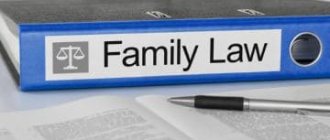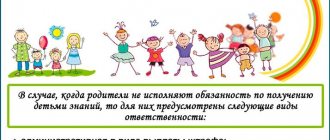Education Law: Rights and Responsibilities of Parents
In addition to the moral standards established by society, the need for parents to raise a child and the development of children is also determined by federal legislation.
The main document that regulates this is the Federal Law “On Education”, article on the responsibilities of parents No. 44 “Rights, duties and responsibilities in the field of education of parents (legal representatives) of minor students.”
It states the main responsibility of parents - “... to lay the foundations for the physical, moral and intellectual development of the child’s personality.”
Parents' rights
The legislation of the Russian Federation clearly regulates the rights and responsibilities of parents at school. According to the Education Law, parents have the opportunity to choose:
- the form of education of the child - at school, at home, externally;
- educational institution and the opportunity to change it by choosing another;
- the language in which lessons are taught;
- electives, clubs and sections.
Parents are allowed to request:
- legal documents of the school, for example, charter, accreditation and others;
- information about teaching methods and choose the most optimal one;
- data on teacher qualifications.
During the educational process, parents can:
- get acquainted with the student’s grades;
- get acquainted with the curriculum;
- find out plans for extracurricular activities;
- participate in the educational process (for example, be a member of the parent committee);
- be present when children are examined (for example, by psychologists);
- attend the lesson (with the permission of the teacher);
- receive advice from teachers on issues related to both school and extracurricular activities of the student.
The role of the state in the law is defined very clearly: it undertakes to help parents (in accordance with Article 44 of the Law “On Education”).
At the same time, parents are guaranteed complete confidentiality of information about the child and his physical or psychological development. Moms and dads, if desired, directly participate in the management of the affairs of the class or school - they are members of the parent committee. Among the opportunities for parents is the organization of cultural leisure for their offspring: excursions to museums and trips to other cities, visits to industrial enterprises and trips to the forest.
Responsibilities of parents in the new law “On Education”
In accordance with the law, parents are obliged to create all conditions for their child to receive secondary education. That is, provide it:
- clothing (if necessary, uniform);
- a place to prepare lessons and homework;
- necessary school supplies (pens, pencils, notebooks, etc.);
- comfortable living conditions for acquiring knowledge (create a favorable environment in the family);
- full conditions for relaxation after classes.
Monitoring the child's activities is the responsibility of parents to educate their children at school. Only parents, and not anyone else, should monitor:
- regular attendance of the child at school;
- his compliance with all rules of conduct provided for by the school’s governing documents (charter, internal regulations, etc.);
- compliance with safety rules on the way to and from school;
- respect by the child for the honor and dignity of school employees.
Parents must promptly notify teachers about the child’s health status, the characteristics of his behavior, and the reasons for missing classes, if any. If a beloved child, being naughty during recess, breaks the glass, the parents are obliged to compensate the school for the damage caused.
Parents or legal representatives of schoolchildren are required to attend parent-teacher meetings, where the most important topics for the child’s development are considered and discussed, and the results of the quarter are summed up.
Thus, according to Russian laws (again, leaving aside the requirements of public morality), parents are full participants in the educational process, and their role in it is no less important than the role of the teacher.
Responsibilities of parents in the field of education of children
We will need:
— Constitution of the Russian Federation;
— Family Code of the Russian Federation;
— Federal Law of December 29, 2012 N 273-FZ “On Education in the Russian Federation” (hereinafter referred to as the Federal Law “On Education in the Russian Federation”);
— “Code of the Russian Federation on Administrative Offenses” dated December 30, 2001 N 195-FZ (hereinafter referred to as the Code of Administrative Offenses of the Russian Federation).
A short summary of the following.
Parents in the field of education of their child are obligated to:
- raise your children;
— ensure that children receive general education;
— respect the honor and dignity of students;
— respect the honor and dignity of kindergarten, school, and college workers;
— ensure children’s attendance at classes;
- control the completion of homework.
Parents have a priority right to the education and upbringing of their children over all other persons. Those. It is not the grandparents who should control the education of their grandchildren, but the parents.
Art. 5.35 of the Code of Administrative Offenses of the Russian Federation establishes that failure to fulfill or improper fulfillment by parents or other legal representatives of minors of duties for the maintenance, education, training, protection of the rights and interests of minors entails a warning or the imposition of an administrative fine in the amount of one hundred to five hundred rubles.
Yes, I agree, the fine is small. But that's not even the point. After all, the process of bringing to justice will involve such government bodies as the commission for minors, the police, guardianship and trusteeship authorities. And the worst thing that can await parents is the deprivation of their parental rights in relation to the child.
I think you will agree that when they come to check your house or apartment, or call you to a commission where they reproach you in every possible way, this is not the most pleasant thing. And a normal parent will not want a repetition. You and I, teachers, just need to stop being afraid to defend ourselves. No one will do this for you and me.
How to protect yourself as a teacher or class teacher from responsibility for poor preventive work with a student who is truant or whose behavior is suffering, I will tell you in the following educational articles.
The responsibilities of parents do not end with just the banal maintenance of their children. It’s not enough to feed them, clothe them, and educate them. We still need to realize our children’s right to education. We will show you what responsibilities parents have in the field of education.
LEGAL BASIS
According to Part 1 of Art. 43 of the Constitution of the Russian Federation, everyone has the right to education. Part 4 of this article states that BASIC GENERAL EDUCATION IS COMPULSORY. Parents or their legal representatives ensure that their children receive basic general education.
Thus, parents are obliged to ensure that their children attend school until the children receive a certificate of basic general education. It is not the school that should call and ask the parents where their child is, why he did not come today, but the parents should inform the school why the child is not in class. This is the responsibility of the parents. A teacher cannot and does not have the right to come home and demand from parents that their child start attending school.
According to Part 3 of Art. 31 of the Family Code of the Russian Federation, spouses are obliged to take care of the welfare and development of their children. Without discussion, it is clear that education refers to the development of children.
Part 2 art. 61 of the Family Code of the Russian Federation establishes that parental rights provided for in this chapter are terminated when children reach the age of eighteen years (the age of majority), as well as when minor children marry and in other cases established by law when children acquire full legal capacity before they reach adulthood.
That is, we see that until children have reached the age of 18, are married or are not emancipated, parents bear obligations towards them.
In accordance with Part 1 of Art. 63 of the Family Code of the Russian Federation, parents have the right and the OBLIGATION to raise their children. Parents have a PRIORITY RIGHT to the education and upbringing of their children over all other persons.
What do we see? And we see that parents are OBLIGATED to raise their children. Nobody relieved them of this responsibility. In addition, the priority right to education indicates that PARENTS should take part in the education of their children. No grandparents, uncles and aunts, and sometimes even brothers (sisters).
Part 2 art. 63 of the Family Code of the Russian Federation states that parents are obliged to ensure that their children receive a general education. Parents have the right to choose an educational organization, the form of education their children receive and the form of their education, taking into account the opinion of the children before they receive basic general education.
Parents can choose which school their child will attend: state, municipal, private or religious. But PARENTS ARE RESPONSIBLE to ensure that their children receive a general education.
Education is provided through:
— purchase of clothes, school supplies (notebooks, pens, rulers, etc.);
— ensuring the child’s attendance at school;
- control over the child’s homework completion INDEPENDENTLY.
According to Part 1, 2 Art. 65 of the Family Code of the Russian Federation, parental rights CANNOT be exercised in conflict with the interests of children. Ensuring the interests of children should be the main concern of their parents. Parents who exercise parental rights to the detriment of the rights and interests of children are liable in accordance with the procedure established by law. All issues related to the upbringing and education of children are resolved by parents by mutual consent based on the interests of the children and taking into account the opinions of the children.
Thus, parents cannot help but bring their child to school, because this is their main concern according to the law.
It turns out that if the parent does not:
- ensures that the child comes to school, and the child is absent;
- controls the completion of homework, then it turns out that he does not ensure that the child masters general education. And parents MUST be responsible for this according to the law. After all, failure to comply with these conditions clearly goes against the interests of the child.
According to Part 2, Clause 3, Part 4, Art. 44 Federal Law “On Education in the Russian Federation”, state authorities and local governments, educational organizations PROVIDE ASSISTANCE TO PARENTS (legal representatives) OF MINOR STUDENTS IN RAISING CHILDREN, protecting and strengthening their physical and mental health, developing individual abilities and the necessary correction of their developmental disorders . PARENTS (legal representatives) of minor students MUST RESPECT THE HONOR AND DIGNITY OF STUDENTS AND EMPLOYEES OF THE ORGANIZATION CARRYING OUT EDUCATIONAL ACTIVITIES.
Please note once again that the primary responsibility for raising children lies with THEIR PARENTS; schools HELP parents, and not vice versa. Parents should respect teachers and communicate with them within the bounds of decency, and not as is now customary.
It’s not enough to give birth to children, they also need to be raised and educated! Do you agree?
Source: https://vk.com/perfect_lawyer
Violation of children's rights at school
Cases of violations by individual teachers of the rights of schoolchildren or their representatives regulated by law cannot be ruled out.
This most often occurs due to the incompetence of the school administration or individual representatives of the teaching staff. Most often, violations are associated with:
- with disrespect for the honor and dignity of the student;
- with unreasonable hostility towards the student;
- with non-compliance with the confidentiality of information about the student;
- with the collection of funds for the needs of the school (if this is not regulated by the school charter).
Parents are the legal representatives of their children
In accordance with Art. 64 of the Family Code of the Russian Federation, the parents of a minor child are his legal representatives until the child reaches the age of majority - that is, the age of 18 years. This formulation of the law implies that parents are obliged not only to raise their child and support him financially, but also to represent the interests of the minor.
Quite often, minor children become participants in any legal relations, for example, hereditary ones, in which the law allows only parents who are legal representatives to represent the interests of children. The Family Code also establishes that parents represent the interests of their child not only when interacting with government bodies, organizations and institutions, but also in court.
Chapter 12 of the Family Code quite extensively prescribes and regulates the rights and responsibilities of parents to protect the rights and interests of children. The law also establishes that both father and mother can represent the interests of the child equally and have equal rights to do so (Article 61 of the Family Code).
Thus, parents, being the legal representatives of their children, are obliged to ensure that they respect all property and non-property personal rights. In some cases, the law provides for control over the fulfillment of their duties by parents. For example, in some cases, parents require permission from the guardianship authorities to perform certain actions on behalf of their child (for example, the sale by parents of real estate owned by a minor).
What should parents of a child whose rights have been violated do?
What to do if teachers or school administration violate a child’s rights?
In no case should the offense be ignored: any of the listed violations can traumatize the fragile child’s psyche, and the consequences of this trauma will have a negative impact in the future. Parents of a child whose rights have been violated must:
- Submit a written complaint to the school principal. In the document, indicate the surname, name and patronymic of the applicant, state the essence of the violation and demand that the problem be eliminated.
- If the management's complaint does not bring results, send a similar statement to the education department.
- If the violation of rights is flagrant and contrary to the law (for example, endless monetary extortions), a complaint must be sent to the prosecutor’s office.
The rights of all participants in the educational process, including students and their parents, are determined by a large number of legislative acts.
The main ones are:
- Convention on the Rights of the Child (Adopted by UN General Assembly resolution 44/25 on November 20, 1989. Entered into force on September 2, 1990.)
- Constitution of the Russian Federation
- Law of the Russian Federation “On Education”
- Family Code of the Russian Federation
- Law of the Russian Federation “On Basic Guarantees of the Rights of the Child in the Russian Federation”
The rights of participants in the educational process in relation to an educational institution are also regulated by the Model Regulations on a general education institution, evening school, boarding school, etc.
The rights and obligations of students, their parents (legal representatives) as participants in the educational process are determined by the charter of the educational institution and other local acts provided for by the charter.
The school administration and public authorities (meeting, council, parent committee, etc.) are called upon to protect the rights of students and parents.
Student self-government is also developing in St. Petersburg schools.
The activities of a general education institution are based on the principles of democracy, humanism, accessibility, the priority of universal human values, human life and health, citizenship, free development of the individual, autonomy and the secular nature of education
Students in state and municipal educational institutions have the right to:
- receiving free general education (primary, basic, secondary (complete) in accordance with state educational standards;
- training in accordance with state educational standards according to an individual curriculum; accelerated course of study. The conditions of study according to individual curricula are regulated by the charter of the general education institution and other local acts provided for by the charter;
- free use of library and information resources of the library of a general education institution;
- receiving additional (including paid) educational services;
- participation in the management of a general educational institution in the form determined by the charter of the general educational institution;
- respect for human dignity, freedom of conscience and information, free expression of one's own views and beliefs.
A general educational institution is prohibited from engaging students in work not provided for in the educational program without their consent and the consent of their parents (legal representatives).
Forcing students to join public, socio-political organizations (associations), movements and parties, as well as forcing them to participate in the activities of these organizations and to participate in campaigns and political actions is not allowed.
Parents (legal representatives) of students have the right:
- choose a general educational institution and form of education;
- protect the legal rights and interests of children;
- participate in the management of a general education institution in the form determined by the charter of this institution.
Rights and responsibilities of students and parents at school article on the topic
Our school has developed an original educational system. It is based on a complex of pedagogical ideas, system-forming activities, and a unique structure. The core of this system was a closely knit team of children, parents and teachers, using democratic forms of management in their work. They are based on the study of human rights and fundamental freedoms.
Knowledge of one's rights and freedoms, the ability to realize and protect them, a clear understanding of personal freedom and responsibility, the ability to resolve disputes and conflicts by legal means - this is what currently forms the basis of the legal culture of citizens.
RIGHTS AND RESPONSIBILITIES OF THE STUDENT
The student has the right:
1. The right to receive free education in accordance with state educational standards. Development of your personality, your talents, mental and physical abilities.
2. The right to education within the framework of the state educational standard according to individual curricula, in the manner determined by the charter of the school (home education for medical reasons).
The teaching load and the schedule of students’ classes are determined by the school’s Charter on the basis of recommendations agreed with the health authorities.
3. The right to freely express one’s own views, beliefs and opinions in a correct form that does not humiliate the rights of other people.
The student's views are given due weight in accordance with his age and maturity.
4. The right to be heard.
5. The right to receive information appropriate to his age, goals and objectives of the educational process.
6. The right to freedom of thought, conscience and religion.
7. The right to respect for human dignity.
8. The right to teacher assistance in additional classes provided for by the school schedule.
9. The right to receive additional paid educational services, in accordance with the School Charter.
10. The right to an open assessment of a student’s knowledge and skills, receiving a grade in each subject solely in accordance with their knowledge and skills.
11. The right to advance notice in carrying out control work in accordance with the schedule.
12. The right to know about the number of control works during the day and per week in accordance with sanitary standards.
13. The right to know about the grades assigned to him for oral answers and written work.
14. The right to confidentiality of the evaluation of your answer or written work.
15. The right to request a postponement of test dates after absences due to illness, confirmed by medical documents.
16. The right to rest during breaks between lessons and during vacations.
17. The right to participate in the cultural life of the school and events organized there that are appropriate to the student’s age.
18. The right to participate in the management of an educational institution in the manner determined by the school’s Charter (School Council).
19. The right to participate in speeches of the school press, conferences, open microphones.
20. The right to contact the Commissioner for the rights of participants in the educational process.
21. The right to transfer to another educational institution implementing an educational program of the appropriate level, with the consent of this educational institution and their successful completion of certification.
Student responsibilities:
General rules of conduct
1. The student comes to school 15 minutes before the start of classes, is clean and tidy, takes off his outerwear in the wardrobe, puts on a change of shoes, takes a workplace and prepares all the necessary school supplies for the upcoming lesson.
2. You cannot bring weapons (including knives), explosives, or flammable substances into the school territory for any purpose and use them in any way; alcoholic drinks, cigarettes, drugs.
3. Chewing gum is not allowed at school.
4. It is not allowed to use players and mobile communications during lessons.
5. It is prohibited to use obscene expressions and gestures.
6. You cannot leave school during school hours without the permission of the class teacher and the administrator on duty (nurse). You can leave the school by presenting a note from the class teacher and the administrator on duty, (medical worker) to the school security guard who, together with the duty officer on the 1st floor, writes down the student’s time of leaving school in the duty notebook.
7. In case of absence from classes for up to 3 days, the student must present to the class teacher a certificate from the clinic or a statement from the parents (their substitutes) about the reason for absence from classes. For more than 3 days, the student must provide a certificate from a medical institution.
8. Smoking is prohibited on school premises. If this clause is repeatedly violated, the student’s parents will be held administratively liable in accordance with the law.
9. School students must respect the dignity of students and school employees.
10. Physical violence, intimidation and bullying, attempts at personal humiliation, and discrimination based on nationality are unacceptable forms of behavior.
A student who violates this clause is subject to administrative or criminal liability in accordance with the law.
11. Disciplinary measures will be taken against a student who does not maintain cleanliness and order on the territory and in the school building.
12. The student takes care of school property and treats his own and other people’s property carefully. In case of damage to school property (breakage or damage to furniture, equipment, dishes, walls, etc.), parents (legal representatives) are obliged to compensate it.
13. The student must respect property rights. School supplies, clothing and other personal items in the school belong to their owners.
14. Disciplinary measures are taken against a student who has appropriated or damaged other people’s things, including criminal liability.
15. A student who finds lost or forgotten items hands them over to the administrator on duty or the security guard on duty.
16. Takes part in activities to improve the school and school grounds, to the best of his physical abilities.
Behavior in class
1. When the teacher enters the class, the students stand up and greet the teacher. Students will similarly greet any adult who enters the classroom during class (except during computer time and during tests and labs).
2. The student is required to complete homework within the time limits set by the teacher.
3. At the first request of the teacher, the student presents his diary.
4. Students from grades 1-11 are required to keep a diary. At the first request of the teacher, the student presents his diary.
5. The student is required to have the necessary textbooks, notebooks, manuals, tools and writing materials during classes.
6. During lessons, it is forbidden to be distracted yourself or distract others from classes with extraneous conversations, games and other matters not related to the lesson.
7. The student raises his hand if he wants to ask the teacher a question or answer a teacher’s question.
8. The student has the right to ask questions to the teacher during the lesson if he does not understand the explanation material.
9. If during class a student needs to leave the classroom, he must ask the teacher’s permission.
Student behavior during breaks and after classes.
1. During a break, the student must:
• bring cleanliness and order to your workplace;
• be in the school's recreation areas;
2. Recess time is each student’s personal time. The student must not violate the rules of conduct at school:
• It is prohibited to run around the school, push each other, throw objects and use physical force.
• Unauthorized opening of windows, sitting on window sills.
• Submit to the requirements of the teacher on duty for the floor.
3. The duty class helps the duty teacher to monitor compliance with discipline during breaks.
4. During recess, each student can turn to his class teacher, duty teacher, duty administrator or authorized representative for the protection of the rights of participants in the educational process for help if an illegal action is committed against him.
Student behavior in the cafeteria
1. During meals, students should adhere to good manners and behave decently:
• The student treats cafeteria workers with respect.
• Students treat the property of the school canteen with care.
• It is not allowed to talk loudly, run or play in the dining room.
• The student is required to clear the dishes from the table after eating.
2. It is not allowed to take drinks, sandwiches, and other food products purchased from the buffet out of the dining room.
3. The student has the right to bring breakfast brought from home to the dining room.
4. Class attendants set the table for meals for the whole class in advance (10 minutes before the end of the lesson) (express breakfasts, lunches)
5. The class on duty monitors the cleanliness and order in the dining room and helps set tables for the primary classes.
6. It is prohibited to come to the dining room in outerwear.
Responsibilities of the class attendant
1. Duty officers are appointed in accordance with the class duty schedule.
2. They help the teacher prepare the class for the lesson and clean the classroom as much as possible.
3. During breaks, they ventilate the classroom, help the teacher hang up educational material for the next lesson, and distribute notebooks at the teacher’s request.
4. After finishing the lessons, they prepare the classroom for the next working day (they wipe dust from the furniture, water the flowers, wash the floor, take out the trash).
5. The attendants of grades 1-4 carry out all possible cleaning (wiping desks, watering flowers, taking out trash).
Responsibilities of the duty class at school.
The class on duty comes to school for morning assembly at 7:45 am. They hand over duty to the duty administrator after school.
1. School duty officers:
- maintain cleanliness and order in the school;
— carry out the instructions of the teacher on duty and the administrator;
- report violators of discipline to the teacher on duty and the administrator;
2. Dining room attendants:
- monitor the cleanliness and order in the dining room;
— help set tables for primary classes;
- they are not allowed to leave the dining room with sandwiches and drinks. To take action against troublemakers, turn to the teacher on duty for help.
or the duty administrator;
— after breaks, they remove the dishes left on the tables, sweep the floor in the dining room and on the school grounds.
3. Person on duty at the entrance:
— carries out the instructions of the security guard and the administrator on duty. Invites teachers and students to the 1st floor for a conversation if parents contact them.
Recommendations for the appearance of students
1. Students come to school in neat clothes intended for class. It is prohibited to come to school wearing tank tops, miniskirts, low-cut tops, and shorts.
2. You cannot wear excessive makeup or jewelry at school.
3. At school, all students wear removable shoes.
4. Sportswear is intended only for physical education lessons.
5. It is not permitted to wear outerwear at school without any special reason.
6. Students come to formal school events in full dress uniform (boys - suit, tie; girls - white top, dark bottom)
7. For holiday discos and evenings, students choose clothes on the recommendation of their parents and at their own discretion.
RIGHTS AND OBLIGATIONS OF TEACHERS AND EDUCATORS
A teacher or educator has the right:
1. To protect professional honor, human dignity, if it is violated by the administration, parents of a student or student.
2. To freedom of conscience.
3. Express (orally or in writing) in a correct form, without violating the legal space of a teacher or educator, critical remarks about the activities of any employee of the school or education system.
4. Contact the administration regarding questions of interest. Be heard and get an answer.
5. Apply individually or as part of a group of people to the Commissioner for the Rights of Participants in the Educational Process, or to any higher authorities with statements, proposals, and complaints.
6. Familiarize yourself with the school’s Charter, regulations and legislative acts related to the educational process.
7. Know about your job responsibilities.
8. Improve your qualifications, independently determine the forms and methods of your educational activities within the framework of the educational concept of the school. Use modern and traditional teaching methods.
9. Demand that the school administration create conditions for the implementation of the educational process, obtain a workplace equipped in accordance with sanitary and hygienic standards and labor protection standards, supplied with the necessary aids and other materials.
10. For material incentives in the form of additional payments, allowances, bonuses.
11. Participate in the organization and management of the school, nominate oneself for any position.
12. For creativity, initiative in mastering educational and developmental programs.
13. Be informed in advance about the replacement of lessons. The teacher has the right to refuse to replace lessons, stating the reason for the refusal.
14. Refuse administrative assignments not related to the performance of one’s official duties and specific obligations.
15. For time off for work on weekends. The number of days off is determined by the school director together with the trade union committee, in accordance with the internal labor regulations.
16. The teacher of the extended day group, working in accordance with the established schedule, has the right to notify the administration about the parents’ violation of the contract if the parents do not come for the child at the appointed time.
17. The teacher does not have the right to exclude a student from the lesson.
18. A physical education teacher has the right not to allow students to attend classes without a sports uniform (a student who has forgotten his uniform and is excused from classes is in the gym)
19. Express claims and comments to the student in a sensitive manner.
20. Require parents to create normal conditions for the child’s studies (workplace, daily routine).
21. Require parents to attend parent-teacher meetings, in accordance with the constitutional duties of a parent.
22. If necessary, together with the parent committee and social teacher, visit the student at home in order to identify the living conditions and education of the child,
24. To protect against unjustified interference of parents in the professional responsibilities of a teacher.
25. Require the student to comply with the Rules of school life and respect for the traditions of the educational institution.
26. Involve students in leading a healthy lifestyle.
.
RIGHTS AND RESPONSIBILITIES OF PARENTS
Parents (or legal representatives) have the right:
1. To choose for your children (before they receive basic general education) forms of education and types of educational institutions.
2. To admit children to an educational institution (school No. 494) in accordance with the school’s Charter.
3. To familiarize yourself with the Charter of the educational institution and other documents regulating the organization of the educational process. For complete information about the educational process.
4. To participate in the management of the educational institution in which their children study (School Council, Board of Trustees).
5. To become familiar with the progress and content of the educational process, as well as with assessments of the progress of their children.
6. To transfer a child who has received education in the family to continue education to an educational institution with positive certification.
7. If controversial issues arise, discuss them with teachers or school administration and contact the Commissioner for the Rights of Participants in the Educational Process.
8. Provide religious and moral education for children in accordance with their own beliefs.
9. Provide voluntary financial assistance to the educational institution in the form provided for by the Charter; gets acquainted with materials on the use of allocated funds.
10. Parents living separately from the child have the right to attend parent-teacher meetings, as well as to receive information about their child, unless this is contrary to the law and does not harm the child.
11. Demand respect for the rights of the child.
12. For an additional meeting with the teacher (after school), if the parent believes that there is a reason for this.
14. Express reasonable criticism of the school at parent meetings and when meeting with the school principal.
15. For timely information about parent meetings and meetings of the parent community with the school principal.
16. In the event of a conflict between a parent and a teacher, between a teacher and a student, as well as in the event of a conflict between the students themselves, the transfer of the child with the consent of the administration to another class.
Parental responsibilities
1. Ensure and protect the rights and interests of their children, without causing harm to their physical and mental health and moral development.
2. Raise children, excluding neglect; rude, cruel, degrading treatment, insult, exploitation.
3. Ensure that children under 15 years of age receive basic general education in a comprehensive school or other educational institution equivalent in status.
4. Comply with the Charter of the educational institution.
5. Monitor class attendance, homework completion and the results of the educational process.
6. Be responsible for eliminating the child’s debt during the educational process.
7. Regularly attend parent-teacher meetings, come to school when called by the class teacher, teacher or administration.
8. Avoid unjustified interference in the work of teachers on issues that, by their nature, fall within the scope of their professional duties.
9. Provide, to the best of your abilities and financial capabilities, the living conditions necessary for the normal development of the child.
10. Provide the child with the necessary stationery and school supplies, sports uniforms, and additional teaching aids.
11. Allow the child to attend extracurricular school activities if the child is healthy and wishes to do so.
12. If possible, allocate financial resources from the family budget for visiting theaters and museums, if required by the class or school program.
13. Parents are obliged to monitor the child’s appearance.
14. Participate in the life of the class and school.








